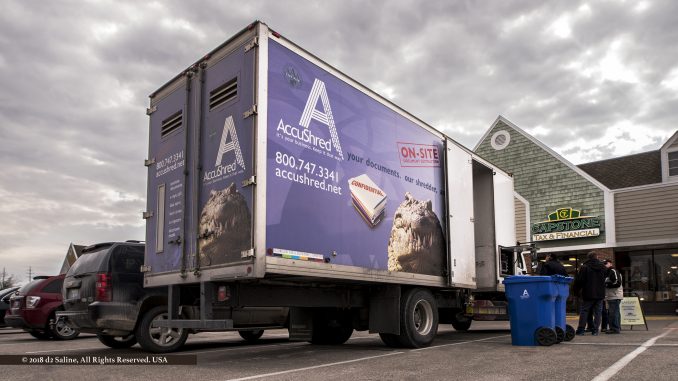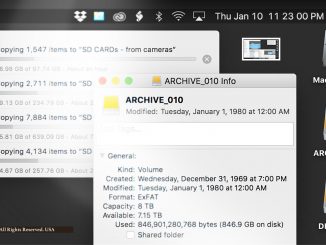
Never simply throw away papers related to your income tax filings. Instead, either file them away securely or destroy them by means that render them irretrievable.
Before taking either action it’s important to know what physical documents you’ll need to keep, why, for how long, and to what degree of easy accessibility. While you’re thinking about such things, get smart on what it means to keep papers “safe” as well as “secure.” [1,2,3,4,5,6,7,8]
As to the other stuff: There’s a seemingly never ending and still growing list of reasons not to have anything related to your tax prepartions end up decipherably in the wrong hands. According to Javelin Strategy & Research, identity fraud hit an all time high in 2017, affecting 16.7 million victims here in the United States alone. [9]
Credit card and bank fraud immediately come to mind.
But the Federal Trade Commission receives an alarming number of complaints in less commonly discussed categories as well. For example, almost 15% of all identity theft-related complaints last year were associated with phone or utility services, another more than 8% to lease agreements, and just under 7% to procuring government benefits. [10]
Nationwide, the next seven days of scheduled trash and recyclable pickups represent a treasure trove for criminals. What other time of year has a greater concentration of data, covering so many important details related to one’s life?
For those inclined to try and deal with such accumulations, the Ann Arbor OfficeMax on Oak Valley Drive offers eight different shredder models — all currently in stock. The “High Security” options discharge cross-cut strips. “Maximum Security” reduces paper to confetti. [11]
If this seems like overkill, the idea of extracting anything deciferable from such remains the stuff of James Bond fiction, think again. In 2012, DARPA offered a $50,000 to anyone who produced “a computer program that could analyze bits of shredded documents and piece them back together.” It took just over a month for a winner to emerge. [12,13]
Capstone Tax & Financial offered something even better today. [14]
To mark the end of personal income tax filing season — or, at least what should have been the end — Capstone offered free paper document shredding services at its Saline location. This is the second year they’ve done it. In 2017, they provided shredding for over 3000 pounds of paper.
Christopher J Michalak, Financial Adviser and Enrolled Agent with Capstone, described this as “a service to our clients and the community.
“There are more and more sensitive documents out there,” he told Saline Journal. “And those documents have more and more sensitive information on them.” Mr Michalak then went on to reinforce the importance of knowing the difference between what needs to be kept and what does not, assuring that Capstone remains available to help taxpayers tell the difference.
For those interested in technical details on the shredding process itself here, Capstone commissioned AccuShred of Toledo for this service. AccuShred offers the option of onsite shredding or collection for subsequent processing at its home facility. The former “costs a little more,” technician Jason Dickson explained. “But it gives some people greater peace of mind.” [16]
Capstone opted for onsite shredding.
A live video feed from a camera placed inside the processing truck bay allows both Mr Dickson and customers to see their materials being processed in real-time. The low speed rotary grinder can process up to 300 pounds in five to ten minutes. Additionally, when the truck unloads at the secure AccuShed operation in Ohio, further handling will ultimately result in 100% of its load going back into new paper products.
Conceivably, some part of that could end going into tax returns filed next year.
But none of those will have a trace of the time or content it had here in Saline today.
References
- “How long should I keep records?” Internal Revenue Service (IRS).
- “Topic Number: 305 – Recordkeeping” IRS.
- “How Long to Keep Tax Records and Other Documents” (March 8, 2018) Consumer Reports.
- “Never throw away your tax returns” Eva Rosenberg (April 22, 2013) Market Watch.
- “Record Retention Guide: How Long To Keep Tax Records” Michigan Chapter of the NATP (National Association of Tax Professionals).
- “5 Things to Know About Safe Deposit Boxes, Home Safes and Your Valuables” Federal Deposit Insurance Coporation (FDIC).
- “What you should (and shouldn’t) store in a safe-deposit box” Dana Dratch (October 31, 2017) Bankrate.
- “Choosing and using a home safe” (January 1, 2011) Consumer Reports.
- “Identity Fraud Hits All Time High With 16.7 Million US Victims in 2017, According to New Javelin Strategy & Research Study” (February 6, 2018) Javelin Strategy & Research.
- “Consumer Sentinel Network Data Book 2017: Report Type, Top 10 Fraud Categories, Identity Theft Types, Other Categories” Federal Trade Commission (FTC).
- OfficeMax (local store).
- “Carte Blanche (2011)” Jeffery Deaver.
- “How Safe Are Your Shredded Documents?” Mary Beth Griggs (January 16, 2012) Life Science.
- Capstone Tax & Financial (home page).
- “Deadline extended for state of Michigan, Detroit income tax returns” Dave Bartkowiak Jr (April 18, 2018) Click on Detroit.
- AccuShred (home page).



